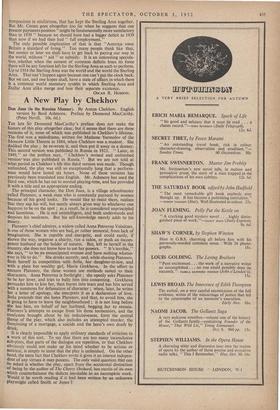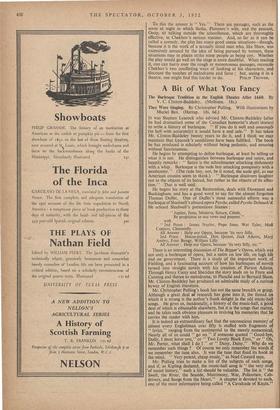A New Play by Chekhov
Don Juan (in the Russian Manner). By Anton Chekhov. English version by Basil Ashmore. Preface by Desmond MacCarthy. (Peter Nevill. 10s. 6d.) THE late Sir Desmond MacCarthy's preface does not make the history of this play altogether clear, but it seems that there are three versions of it, none of which was published in Chekhov's lifetime. The first was a melodrama, written for Madame Yermolov of the Moscow Little Theatre in 1884, when Chekhov was a student. She disliked the play ; he re-wrote it, and then put it away in a drawer. This second version was published in Russia in 1923. " Later, in 1949," so the preface says, " Chekhov's revised and unfinished version• was also published in Russia." But we are not told at what period in Chekhov's life this third version was made. Though unfinished, the play was still so exceptionally long that a perform- ance would have lasted six hours. None of these versions has previously been translated into English. Mr. Ashmore has used the third one, which he has cut to normal playing-time, and has provided it with a title and an appropriate ending.
The principal character, the Don Juan, is a village schoolmaster called Platonov, a weak man who is constantly pursued by women because of his good looks. He would like to resist them, realises that they sap his will, but nearly always gives way to whichever one happens to be on the spot ; as a result, he is considered unprincipled and licentious. He is not unintelligent, and both understands and despises his weakness. But his self-knowledge merely adds to his misery.
Platonov's chief admirer, a widow called Anna Petrovna Voinitzev, Is one of those women who are bad, or rather immoral, from lack of imagination. She is capable and energetic, and could easily, if shown the way, organise a charity, run a salon, or push an incom- petent husband up the ladder of success. But, left to herself in the country, she does not know how to use her powers. " It's terrible," she says, " to be an emancipated woman and have nothing whatso- ever in life to do." She drinks secretly, and, while chasing Platonov, finds herself in competition with Sofia, her daughter-in-law, and with a plain but wealthy girl, Maria Grekhova. In the effort to ensnare Platonov, the three women use methods suited to their characters. Anna Petrovna is forthright ; she openly asks Platonov to be her lover, and tries to bully him into consenting. Grekhova persuades him to kiss her, then bursts into tears and has him served With a summons for defamation of character ; when, later, he writes her a letter of apology, she interprets it as a declaration of love. Sofia pretends that she hates Platonov, and that, to avoid him, she is going to have to leave the neighbourhood • it is not long before she has • him, on behalf of her husband, begging her to remain. Platonov's attempts to escape from his three tormentors, and the confusion brought about by his indecisiveness, form the central theme of the play, which also includes an attempted murder, the foreclosing of a mortgage, a suicide and the hero's own death by drink.
It is clearly impossible to apply ordinary standards of criticism to a work of this sort. To say that there are too many 'inconclusive sub-plots, that parts of the dialogue are repetitive, or that Chekhov obviously could not make up his mind whether to be serious or satirical, is simply to insist that the play is unfinished. On the other hand, the mere fact that Chekhov wrote it gives it an interest indepen- dent of any virtues it may possess. The only valid question that can be asked is whether the play, apart from the accidental distinction of being by the author of The Cherry Orchard, has merits of its own which counterbalance the defects inevitable in an incomplete work. Would it he worth reading if it had been written by an unknown playwright called Smith or Jones ?. To this the answer is " Yes." There are passages, such as the scene at night in which Sasha, Platonov's wife, and the peasant, Ossip, sit talking outside the schoolhouse, which are thoroughly effective, in Chekhov's serious manner. And, so far as it can be called a comedy, the play has many good comic situations—though, because it is the work of a sexually timid man who, like Shaw, was excessively amused by the idea of being pursued by women, these situations may in places strike some people as being coy. Whether the play would go well on the stage is more doubtful. When readin it, one can hurry over the roi,igh or monotonous passages, reconcile Chekhov's two conflicting ways of looking at his characters, and discount the touches of melodrama and farce ; but, seeing it in a theatre, one might find this harder to do. PHILIP TROWER.



















































 Previous page
Previous page